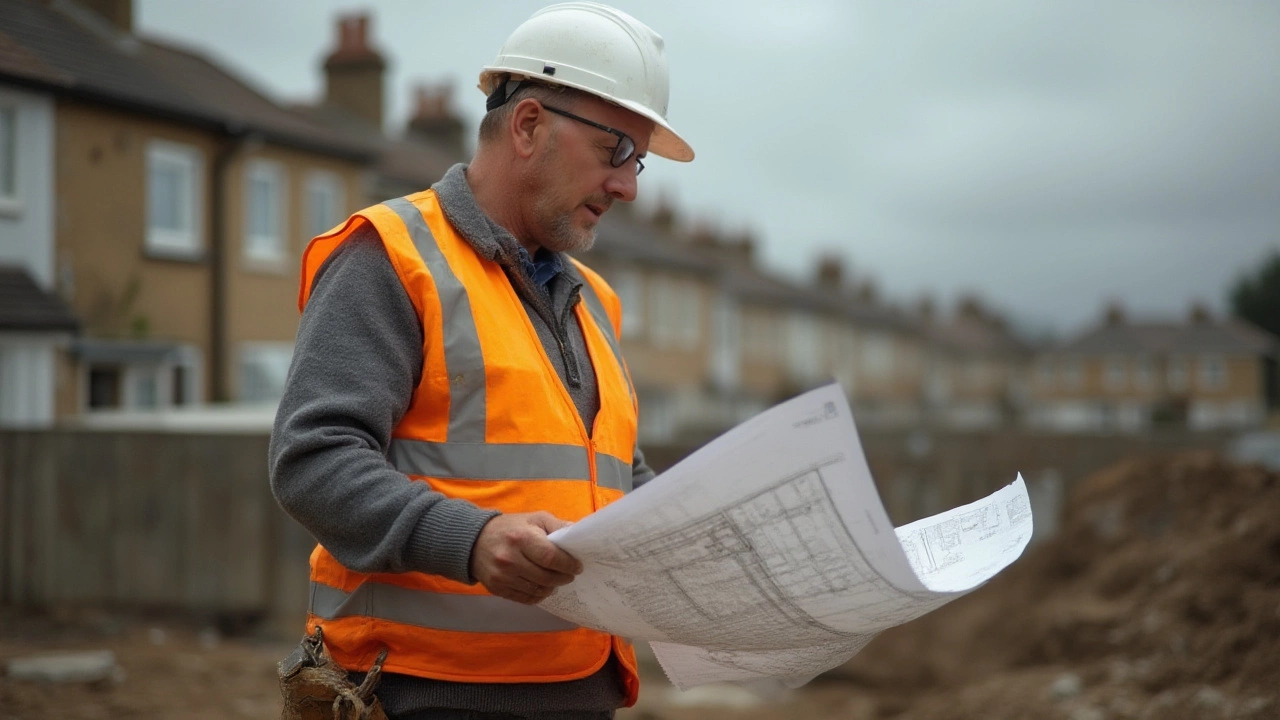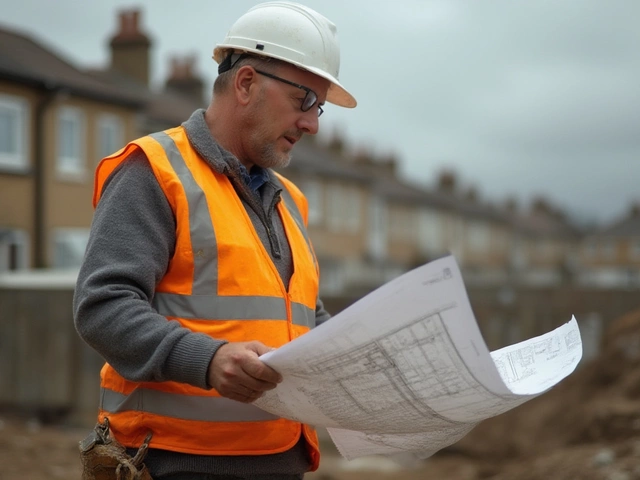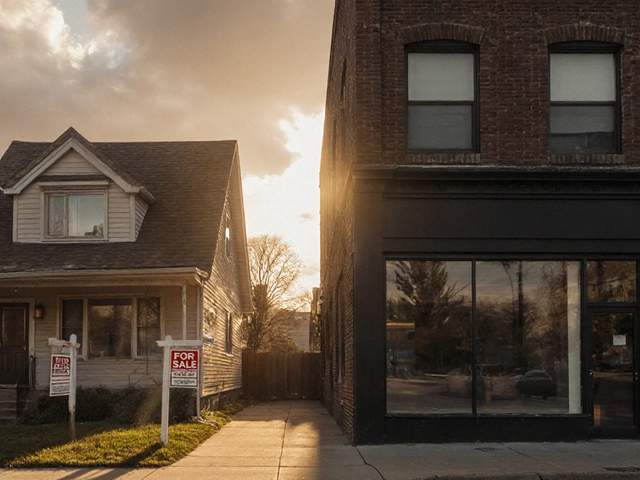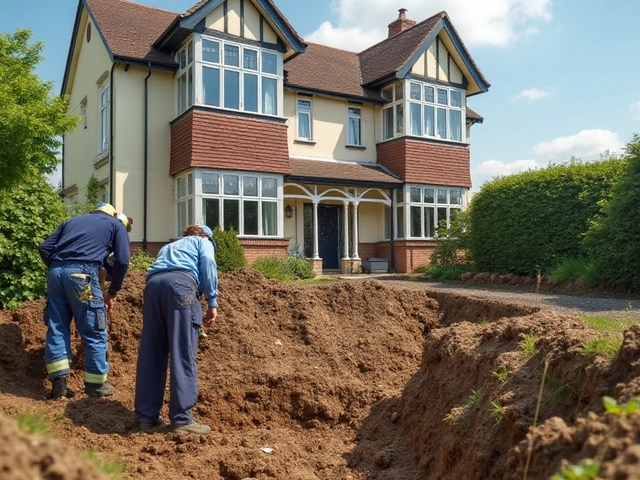If you're planning on building a house or making some property upgrades, picking the right pro for the job isn't as simple as it looks. Ever thought hiring a builder and contacting a construction company meant the same thing? It's a classic mix-up. Most people throw the words around like they're interchangeable, but what they actually do could decide whether you get your dream home or a money pit. Stories of homeowners blaming builders for runaway budgets, while the real culprit was lack of project management from the construction company, are more common than you'd think. Let's pull back the curtain and see what truly separates a builder from a construction company.
The Core Difference: Roles and Responsibilities
So what exactly does a builder do? This word usually evokes the image of someone with a hard hat, blueprint in hand, making sure every measured inch of your house aligns with your expectations. A builder, often called a general contractor, generally oversees the actual construction work. Builders usually work on a smaller scale, thinking custom homes, house extensions, or renovations. Builder vs construction company is less about who has the best toolbox and more about the scale and the scope of responsibility.
Builders often manage a single crew or a group of subcontractors. They'll be onsite, coordinating the framing, electrical, and finishing touches. In smaller projects, you might even find the builder swinging a hammer themselves. Great builders are obsessed with details. Their main job is to make sure the stuff in the plans—walls, roofs, tiles—becomes reality. They typically stick to residential work, and can often be hired directly by a homeowner or through an architect.
Compare this with a construction company. These companies can be massive organizations with fleets of trucks, accounting departments, safety inspectors, and a CEO who might never step foot on your site. Construction companies cover much more ground, literally and organizationally. They often take on commercial buildings, big apartment projects, or government jobs that require a level of paperwork and management beyond the skills of any one person.
Here’s an analogy: If your house is a movie, the builder is the director making sure every scene is filmed correctly. The construction company is the entire movie studio—handling the budget, contracts, marketing, distribution, and everything in between. You'll see this play out when you ask for a quote: a builder hands you a single-page estimate, while a construction company might drop a thick book with legal terms, payment schedules, and insurance papers.
Organization Size, Structure, and Project Scale
The easiest way to spot the difference? It's the scale and who does what on-site. Let’s talk numbers for a minute. In the U.S., according to Associated General Contractors of America, about 80% of builders operate small businesses with fewer than 20 employees. Construction companies, in contrast, often employ hundreds or even thousands of people. That usually comes with a big admin team—project managers, HR, compliance staff, and a long roster of subcontractors on call.
Builders typically juggle one or maybe a handful of projects at a time. Their operations are close-knit, which often means faster communication and more direct oversight. If you call their number, you’re likely to get the guy actually on your job site, not an anonymous office staffer. This is perfect for a homeowner who wants their questions answered fast or who wants a personal relationship with the person running the build.
On the flip side, construction companies thrive on bigger tasks. If you’re building a shopping center or a 10-story condo, you’ll need specialized managers for each aspect—someone for windows, another for electrical, someone just for safety compliance, and even a person whose only job is to handle disputes between subcontractors. The company will often have layers of supervisors. This makes them slow to turn, like a big ship. Your call about moving a window might need sign-off from three people.
Take a look at this quick comparison:
| Aspect | Builder | Construction Company |
|---|---|---|
| Typical Project Size | Single-family homes, small-scale renovations | Commercial, multi-unit, public infrastructure |
| Average Employees | Up to 20 | Hundreds to thousands |
| Management Layers | Usually 1 or 2 | Multiple: Project managers, engineers, HR |
| Approach | Hands-on, personal | Formal, structured |
| Typical Clients | Individual homeowners | Developers, governments, corporations |
| Paperwork | Simple contracts | Complex contracts, insurances, compliance docs |
For anyone trying to pick between them, it usually comes down to the project's size and complexity—and how much red tape you can tolerate before your coffee goes cold.

Legal, Financial and Insurance Considerations
This is where it can get messy. Builders, especially the ones operating independently, will usually carry basic liability insurance and maybe a small bond. That can work just fine for a kitchen extension or a backyard studio. Most local regulations require even small builders to carry at least $1 million in general liability insurance—a figure that's surprisingly easy to burn through if something goes wrong. Ever wonder why your neighbor's builder got into trouble for a broken sewer line, while a giant construction company breezed through a much tougher build? It's about who’s covering the risk.
Construction companies, meanwhile, operate like miniature insurance companies themselves. They're legally required to carry multiple types of coverage: workers’ comp, builder’s risk, pollution, errors and omissions—the list reads like the back of a cereal box (except way more expensive). If a crane tips over while building a new medical clinic, there’s a whole army of insurers waiting on speed dial.
Contracts are another battleground. When a builder gives you a contract, it will mostly be about the start date, payment milestones, and a list of what’s included or not. It’s clear and to the point, which can be a relief—if you trust your builder. Construction companies hand out contracts that run dozens of pages, packed with clauses about weather delays, change orders, penalties (called “liquidated damages”), and step-by-step dispute processes. This can feel like a pain, but it also adds protection. Let’s say a pandemic or oil price spike throws your project off balance; a competent construction company contract will spell out what happens next.
Worried about costs? Here’s a tip: the upfront price can look higher with a construction company, but you're buying guaranteed coverage and management muscle. Surprises are less likely. With a small builder, you might save money initially but risk more chaos if something unexpected happens. Don’t forget the warranty. Good builders stand by their craft, but it’s usually the bigger companies who offer formal warranty programs—with real customer service to back them up months or even years out.
Choosing the Right Fit for Your Project
This is where most of the stress (and the arguments) come from. What should you look for? For most personal home builds or renovations, a skilled builder with strong references keeps things simple and personal. Want custom kitchen cabinets, a new porch, or a major remodel? A great builder can be your best friend—someone willing to find out what kind of knob you want for each drawer. If you have time and want to watch the process closely, this route lets you stay involved.
But big projects (think real estate developments, new business buildings, apartment complexes), or anything needing heaps of permits, safety inspections, or specialized trades, really need a construction company. With so many moving parts, you’ll want a crew that has handled similar projects before and knows how to manage budgets, timelines, and city inspectors without losing their cool.
Here are a few quick tips to consider:
- Ask for a portfolio or examples of completed projects—look for those similar in size and style to yours.
- Check licenses and insurance up front. If they hesitate, that's a big red flag.
- Read online reviews, but also ask to speak with recent clients directly. People love sharing building war stories.
- For large projects, make sure there's a dedicated project manager assigned to your job. You do not want to get lost in the shuffle.
- Get clear, itemized quotes. Ask about what happens if you make changes—some builders are flexible, while construction companies often charge pricey "change order" fees.
And here’s something nobody tells you: Every builder and every construction company has a story about a job that went sideways. It’s not about finding someone with a spotless record—because those don’t exist. It’s about finding a team that learns from mistakes and communicates fast when things go off script.
Garfield, my stubborn orange cat, pretty much sums it up. Sometimes, you want a simple fix for what’s right in front of you—like a missing dinner bowl. Other times, you need a full system overhaul (just like the time he tried to escape through a window screen, and I ended up rebuilding half the room). Pick the pro who’s sized for the mess you actually have, not just the project you’re dreaming of.







